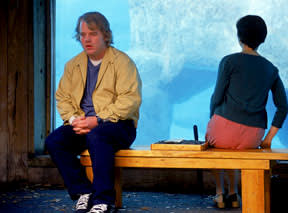The story of Love Liza is very simple. Wilson's (Phillip Seymour Hoffman) wife has committed suicide and left him a letter that he's unable to open. Throughout the movie he tries to run away by huffing gas, obsessing about remote control planes, driving south from reminders of his old life. The only thing he manages to accomplish is a quick addiction to gas fumes. The script is bogged down with too many details (an awful lot seems to happen in three or four weeks) but as long as it stays focused on central characters Wilson and Mary Ann (Kathy Bates as Liza's mother), it's a strange, funny and honest film. Screenwriter Gordy Hoffman (Phillip's brother) tries a different approach to grief and loss. Wilson's inability to deal with his pain provides the momentum the film is saturated in sadness but he refuses to discuss it, and the film does its best to avoid the central point of its plot. It succeeds because the actors are incredible Hoffman plays Wilson with awkward brilliance and the film is confident enough to let silence speak for itself. Director Todd Louiso (best known as the little bald guy from High Fidelity) moves the camera leisurely over scenes, slowly zooming in and pulling out. When he stops to show actors staring into the camera it's more heart-breaking than any sad, maudlin speech could ever be. The loss of Liza is more evident because the audience never gets to know her. She's a fleeting image and a voice on an answering machine. I couldn't help wondering if they should reveal the contents of her letter. It's like Dirk Diggler's dick would Boogie Nights have been better if it was left to our imagination? Love Liza is best when we are left wondering.
Love Liza
Todd Louiso

BY Kathleen OlmsteadPublished Feb 1, 2003